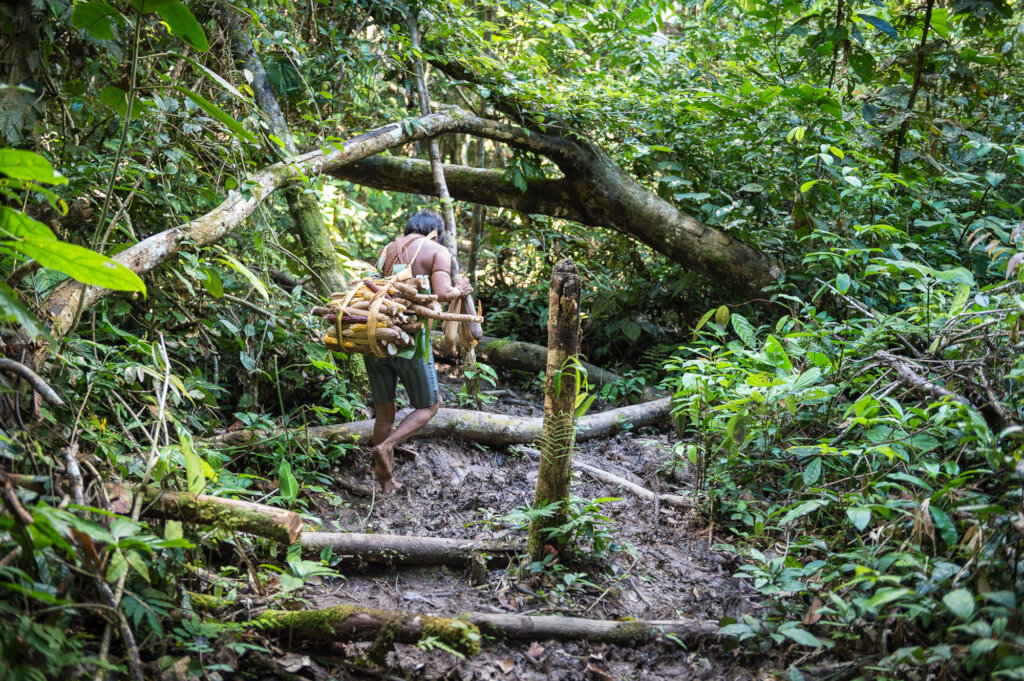By Kelly Brantner | CEO
The start of a new year inspires renewed optimism, and this sentiment holds true for the Vale do Javari region. In this final report, we reflect on the positive impact in 2024, offering a vision of hope and commitment for the region's future, as well as look ahead for the Javari Project.
The Vale do Javari region has witnessed several significant positive developments over the past year, demonstrating the strength and determination of its Indigenous communities. The União dos Povos Indígenas do Vale do Javari (UNIVAJA) has emerged as a powerful voice for Indigenous rights and environmental conservation, gaining international recognition for their steadfast protection of their 8.5-million-hectare territory. Their flagship initiative, the Javari Valley Ethno-Environmental Protection Project (PPEVJ), has been instrumental in strengthening the Indigenous movement throughout the region.
We are encouraged by the Brazilian government's increased engagement, as they have begun implementing precautionary measures to protect Indigenous defenders in the Javari Valley. These measures focus on enhancing territorial security and ensuring accountability for crimes against Indigenous communities. Additionally, the Inter-American Commission on Human Rights (IACHR) has reinforced these efforts by recommending effective protective measures for Indigenous defenders, bringing valuable international attention to the region's challenges.
The Indigenous communities in the Vale do Javari have demonstrated increased resilience to climate change-induced natural disasters, particularly through their effective management of carbon. Indigenous-managed lands in the Amazon, including the Javari Valley, serve as vital carbon sinks, showcasing the communities' critical role in maintaining ecological balance and combating climate impacts.
Two other developments that deserve mention. First, the introduction of Starlink in early 2024 has brought internet access to remote villages, including Marubo tribes, marking a new chapter in their connectivity with the wider world. What this will mean long term for the communities is to be seen. Second, while environmental pressures persist, particularly from potential oil exploration in neighbouring Peru and ongoing illegal activities within the territory, the communities continue to stand firm in their defence of their land.
Looking Forward
As we begin this new year, the Javari Project is undertaking a comprehensive review of their strategy to ensure their support aligns precisely with the evolving needs of Indigenous leaders and responds effectively to the changing global climate.
The Living Pharmacy initiative continues to be a cornerstone of the health pillar, as the Javari Project supports the documentation of medicinal plants and their traditional uses. Other efforts include facilitating the creation of medicinal gardens that serve as living libraries and teaching spaces. And developing protocols for protecting intellectual property rights related to traditional medicines, ensuring that this ancestral knowledge remains under Indigenous control and benefits their communities directly.
Preserving cultural knowledge and practices remains a top priority, especially as the Javari peoples navigate the challenges of ongoing urbanization—a trend impacting many Indigenous peoples worldwide. This makes the initiatives under Pillar One, Alternative Livelihoods, particularly vital. Workshops and programs aimed at fostering sustainable livelihoods and developing the next generation of leaders will be a central focus for 2025.
Despite the seemingly endless cycle of challenging news, the positive developments in the Vale do Javari region provide hope and inspiration. The Indigenous leaders remain steadfast in their commitment to the three foundational pillars outlined in our previous reports, and the Javari Project’s role continues to be one of support and facilitation rather than direction.
BBS and the Javari Project are deeply grateful for your unwavering support and interest in this vital region of our planet and the Javari people who call it home. Thank you!
Project reports on GlobalGiving are posted directly to globalgiving.org by Project Leaders as they are completed, generally every 3-4 months. To protect the integrity of these documents, GlobalGiving does not alter them; therefore you may find some language or formatting issues.
If you donate to this project or have donated to this project, you can receive an email when this project posts a report. You can also subscribe for reports without donating.
